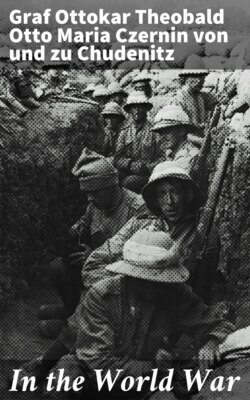Читать книгу In the World War - Graf Ottokar Theobald Otto Maria Czernin von Chudenitz - Страница 8
На сайте Литреса книга снята с продажи.
3
ОглавлениеTable of Contents
Certain extremely important details relating to the period immediately preceding the outbreak of war can only be attributed to the influence of the group represented by Tschirsky. It is incomprehensible why we granted to our then allies, Italy and Roumania, facilities for playing the part of seceders by presenting them with an ultimatum before action was completed, instead of winning them over and involving them also.
I am no accurate judge of the events in Rome, but King Carol in Roumania had certainly tried everything to induce Serbia to yield. In all probability he would not have succeeded, as Serbia had no idea of renouncing her plans for a Greater Serbia; but presumably an anxious feeling would have arisen between Bucharest and Belgrade, which would strongly have influenced further Roumanian policy in our favour.
Bucharest has made enormous capital out of the diplomatic proceedings.
Before the first decisive Cabinet Council Baron Fasciotti, the Italian Ambassador, harangued all the members in this spirit, and declared that the situation in Roumania and Italy was similar, and in each case there was no reason for co-operation, as neither Rome nor Bucharest had previously come to an understanding regarding the ultimatum. His efforts were crowned with success.
On August 1, 1914, I sent the following telegram to Berchtold:
"The Prime Minister has just notified me the result of the Cabinet Council. After a warm appeal from the King to bring the treaty into force, the Cabinet Council, with one exception, declared that no party could undertake the responsibility of such action.
"The Cabinet Council has resolved that as Roumania was neither notified nor consulted concerning the Austro-Hungarian action in Belgrade no casus fœderis exists. The Cabinet Council further resolved that military preparations for the safety of the frontier be undertaken, which would be an advantage for the Austro-Hungarian Monarchy, as several hundred miles of its frontiers would thereby be covered.
"The Prime Minister added that he had already given orders to strengthen all military posts, after which by degrees general mobilisation would follow.
"The Government intends only to publish a short communiqué relating to the military measures taken for the safety of the country."
Secondly, it appears incomprehensible why the ultimatum was drawn up as it was. It was not so much a manifestation of Berchtold's wish for war, as of other influences, above all that of Tschirsky. In 1870 Bismarck also desired war, but the Ems telegram was of quite a different character.
In the present case it appears incomprehensible why a Note should have been selected which by its wording gave umbrage to many who hitherto were favourably disposed towards us.
Had we, before the ultimatum and after the assassination, secretly and confidentially furnished proofs to the Great Powers who were not inimical to us, and especially to England, that trouble was impending over a political murder staged at Belgrade, we should have evoked a very different frame of mind in those Governments. Instead, we flung the ultimatum at them and at the whole of Europe.
It was feared probably at the Ballplatz that any communication to the Powers would result in their intervention in the form of a new conference of ambassadors, and that stagnation would ensue. But in the year 1914 the case was very different from former days—before the ultimatum right was so undoubtedly on our side.
At all events, the Tschirsky group dreaded such an insipid solution, and had insisted, therefore, on drastic action. In 1870 Bismarck was the attacking party, and he succeeded in interchanging the parts. We also succeeded, but in an opposite sense.
